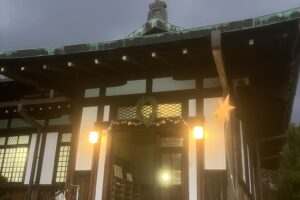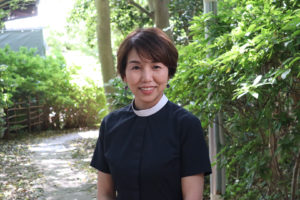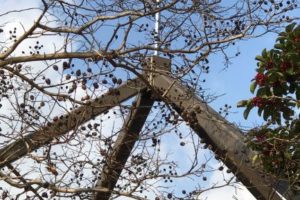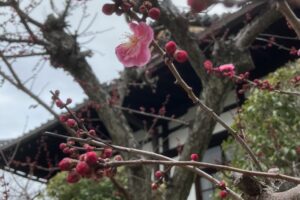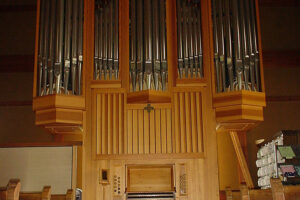Rev. Misa Furumoto
Proper 27, Year B, November 7, 2021
Holy Communion, Nara Christ Church. Mark 12:38-44
Jesus is sitting down quietly near the temple treasury. Perhaps he needed some rest as he had been teaching the crowds in the temple every day since he came to Jerusalem. While he was preaching the words of God to the crowds, his suffering was approaching moment by moment. He just sat there alone and watched the people putting in their money.
The temple treasury of this time period was in the shape of trumpet. If you put a lot of coins in there, they echoed together and made a loud jingling sound. It says, “Many rich people threw in large amounts.” The offerings made by rich people meant a lot of money to many poor people. But Jesus knew that they were not giving out of their hearts to God, but in order to look good. The rich man’s appearance overlaps with those of the scribes criticized by Jesus. They like to walk around in flowing robes and be greeted with respect in the marketplaces. They devour widows’ houses and for a show make lengthy prayers.
While they were jingling and throwing money into the treasury, a woman caught Jesus’ eye. She was a poor widow. As we saw in the Old Testament this morning, a widow is a woman who has lost her husband, which means that she has no way to earn money. The law stipulated that widows had to be protected by society as a whole, which meant that they had to live off the charity of others. They had to ask people for what they could eat for the day. And as Jesus criticized earlier, even this poor life was being eaten up by rich people like the scribes in those days.
At a glance, they must have realized that she was a widow. Jesus stares at her as she approaches the treasury. She puts in two small copper coins. Clink, clink. They worth a penny. That was everything she had, it says, all she had to live on.
The words translated here as “all she had to live on” do not just mean money to live on, but her whole life that she lived. What kind of feeling did the woman have when she offered the two copper coins? Was it an offering of gratitude, or was it a request for God to hear her prayer? If she had two coins, she could have just given one, but she gave both. What was the widow’s expression like when Jesus saw her? Was it a gloomy face, exhausted and lacking the will to live? Or was it an expression of peace and tranquility? Or perhaps a single tear glistening on her cheek? We don’t know from the Bible how she was feeling or how she looked. But what we do know for sure is the fact that Jesus, who was about to give His life to the death of the cross, accepted this woman who was willing to give her whole life before God.
Do you know of anyone in this day who can give their whole life to God? It is such a difficult thing to do. There is one person I think of. His name is Fr. Katayanagi, a catholic monk who is now serving as the head priest at the Catholic Ube Church in Yamaguchi prefecture. He has published many books with his wonderful writings and photos, and has now become quite a famous figure in the church world in Japan. I have personally talked with him a few years ago and had a chance to hear from him how he became a catholic monk. He told me this story.
He was born and raised in a non-Christian family. When he was a law student at Keio University, he was confronted with the death of his father, which made him think deeply about life and death, and how he should live his life. He began going to a church and got baptized, then he decided to travel to Calcutta, India to do some volunteer work under Mother Teresa. He worked there for about a year, until one day Mother Teresa, out of the blue, said to him, “I want you to give your whole life to God.” He was shocked because he had never thought of it. He went back to Japan and continued to pray. He joined the Jesuits, became a monk, and ten years later became a priest.
The reason why I met Fr. Katayanagi was to ask him to give a lecture. What made me shocked was his answer to my question about the lecture fee. He gives lectures all over the country and also appears on TV shows and radio, so I was being afraid to ask how much he should charge for his lectures. He frankly said, “Oh, please you decide. I don’t care. No matter how many lectures I give or how many books I write, the profits will all go directly to our order.” As a member of a religious order, he cannot have any personal property. He doesn’t have a bank account, and he only carries the minimum amount of cash. He almost never uses money for himself.
As another disciple of Jesus, I felt as if I wanted to go into a hole if there was one. The priest, who had a first-class university degree and had many gifts that ordinary people do not have, gave 100% of what he had to give back to God and did not want to leave anything for himself. That’s what it means to be a monk, and that’s the way Mother Teresa lived, or more specifically, the way Jesus lived. What about me? I complain all the time that I’m working too hard for what I am receiving. Sigh.
When we always keep the joy of loving God in our hearts, and when we share that joy with the people we meet, we will not need anything. God will give us everything we need. I am reminded of the kind and radiant faces of Father Katayanagi, Mother Teresa, and the widow who threw in just two copper coins, which was all she had to live on. And it is through their true joy from their heart that we encounter Jesus. Why don’t we follow them? It is the time for us to think about what we can do for God.
In the name of the Father, of the Son, and of the Holy Spirit, Amen.

